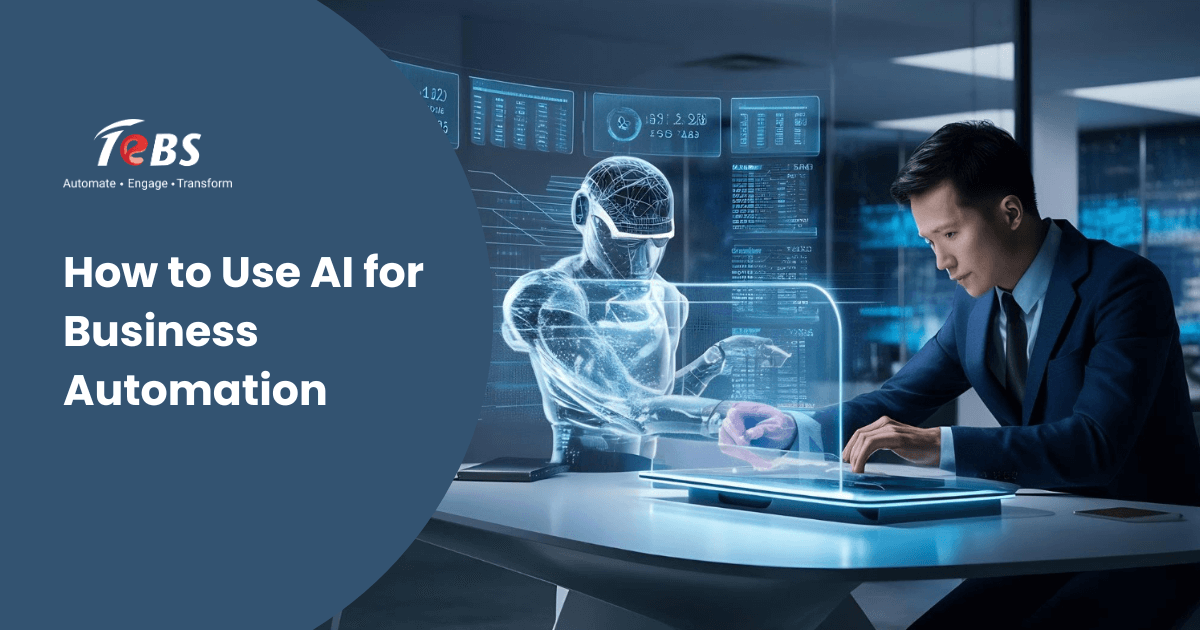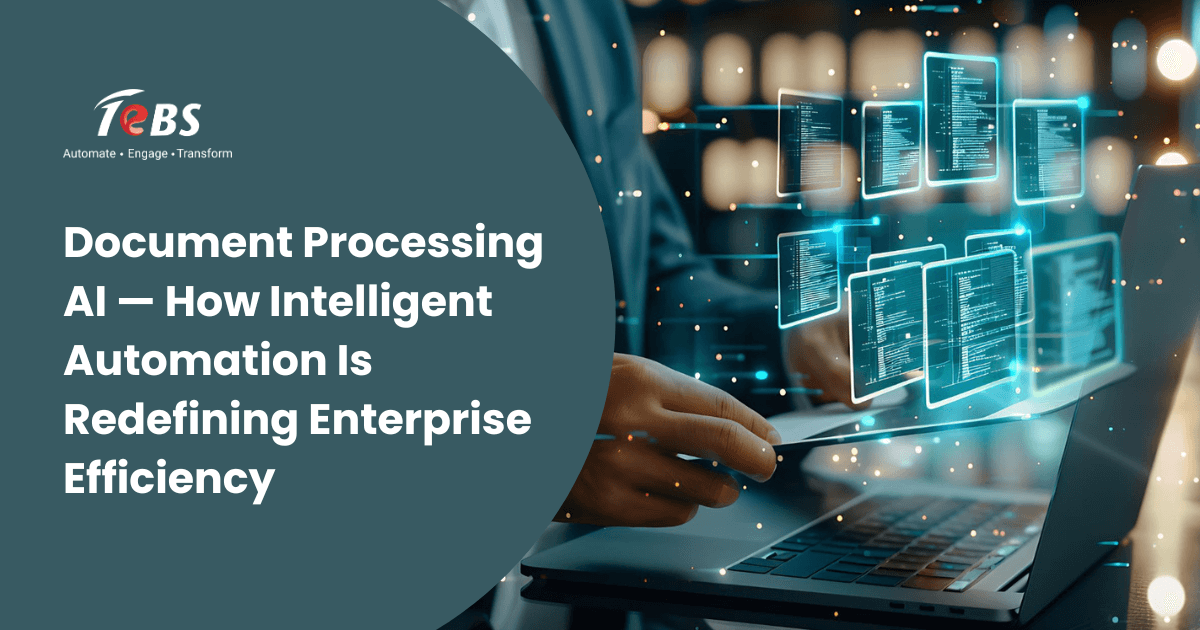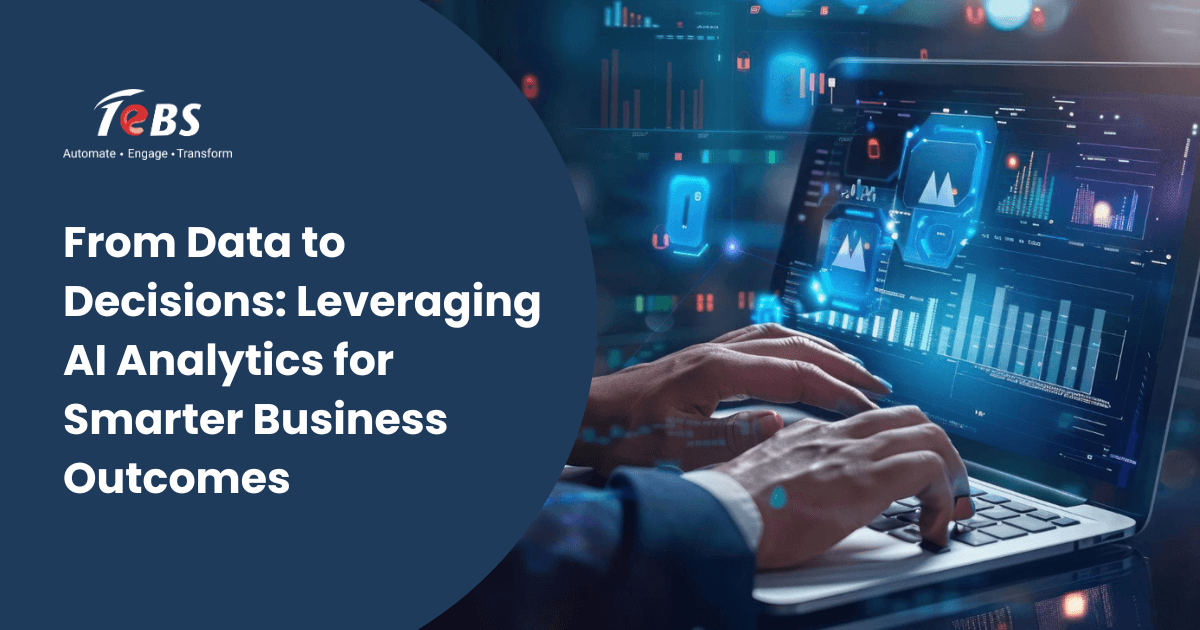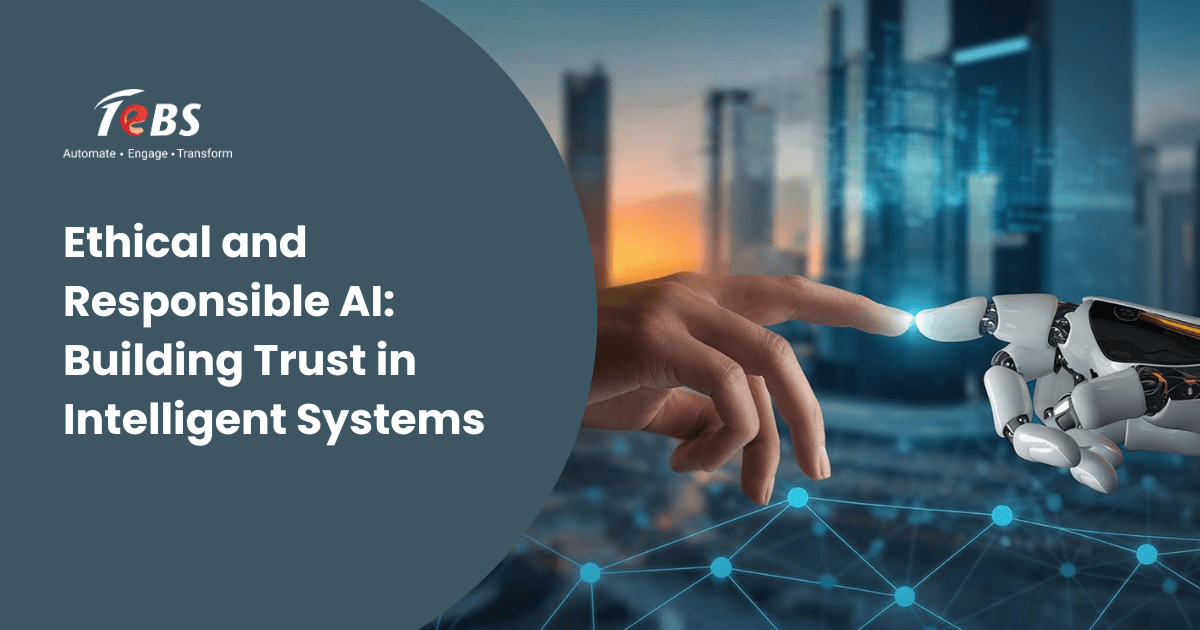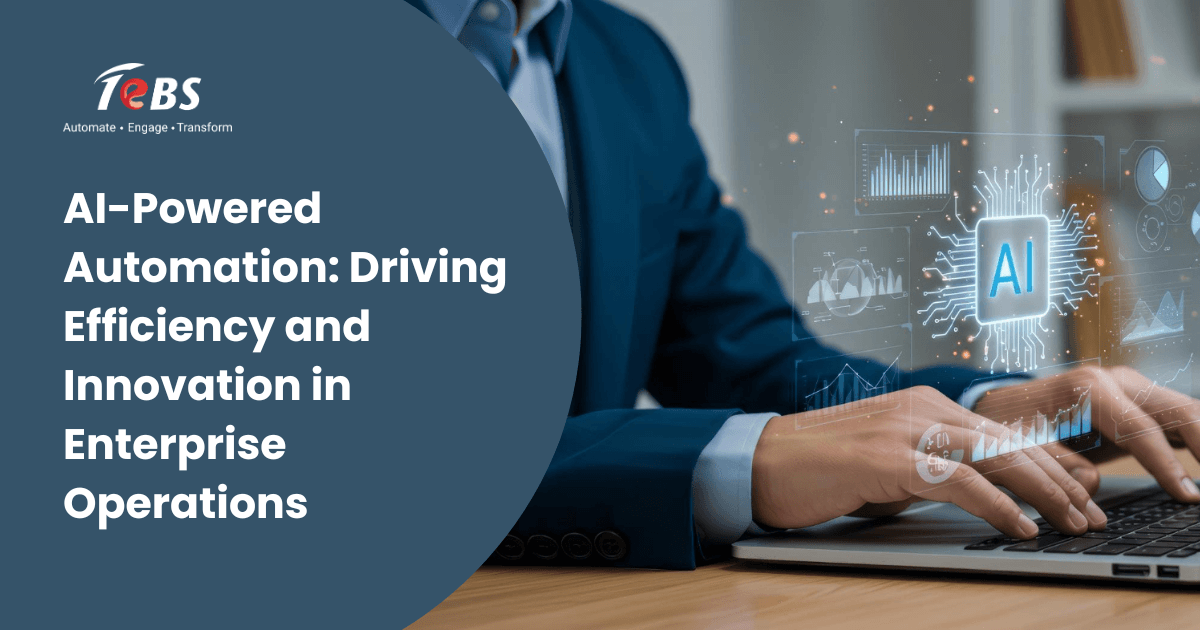Summary
AI business automation uses intelligent systems to handle repetitive, data-driven tasks, reducing costs and improving efficiency. Key applications include chatbots for customer support, sales and marketing automation, finance process automation, and supply chain optimization. Businesses benefit from faster operations, fewer errors, and 24/7 service. Start by identifying repetitive tasks, choosing the right AI tools, and partnering with experts like TeBS.
Introduction
Artificial Intelligence (AI) has moved from being a futuristic concept to becoming an essential driver of business transformation. Today, businesses across industries are embracing AI not only for insights and predictions but also for streamlining and automating operations. The result is faster processes, lower operational costs, and an ability to stay competitive in a rapidly evolving market.
AI business automation leverages intelligent systems to take over repetitive, rule-based, and data-driven tasks that traditionally required human effort. These systems learn from data, adapt to patterns, and execute actions with minimal intervention. This makes them highly valuable in improving efficiency and freeing up employees to focus on strategic, high-value work.
In an era where speed, accuracy, and customer experience define success, AI automation has become a necessity rather than an option. Whether it is managing customer queries around the clock, automating sales workflows, or optimizing supply chains, AI services is enabling businesses to operate smarter and faster.
What is AI Business Automation? Why is it Important Now?
AI business automation is the use of AI-powered tools and platforms to handle operational tasks with minimal human input. These tools can learn from data, make decisions, and perform actions based on pre-defined goals and real-time information.
The importance of AI automation has grown significantly in recent years due to:
- Digital transformation acceleration: Businesses are rapidly moving processes online, creating a need for scalable and efficient automation solutions.
- Data explosion: The sheer volume of business data requires intelligent systems that can process and act on information faster than humans.
- Labour shortages and cost pressures: Companies are seeking ways to optimize resources and reduce dependency on manual work.
- Customer expectations: Modern customers demand instant responses, personalized experiences, and seamless interactions.
By integrating AI automation into their operations, businesses can achieve faster service delivery, more accurate decision-making, and better scalability. By adopting intelligent automation solutions, businesses can streamline operations across departments.
Key Areas Where AI is Used for Automation
Customer Support (e.g., Chatbots)
AI-powered chatbots and virtual assistants can handle a wide range of customer inquiries in real time. They provide instant responses to frequently asked questions, assist with troubleshooting, and even guide customers through purchasing processes. These chatbots work 24/7, ensuring that customer queries are never left unanswered.
Beyond simple FAQs, advanced AI systems use Natural Language Processing (NLP) to understand intent, context, and emotions. They can escalate complex issues to human agents, ensuring a smooth transition and a positive customer experience.
Sales and Marketing Automation
AI tools are transforming sales and marketing by automating lead scoring, campaign management, and personalized content delivery. For example, AI can analyze customer behavior data to identify prospects most likely to convert, automatically trigger follow-up emails, and recommend the best offers.
Marketing automation platforms powered by AI can segment audiences, predict customer needs, and optimize campaigns in real time. This ensures that marketing efforts are targeted, relevant, and more likely to generate results.
Finance and Accounting
AI automation in finance and accounting helps in processing invoices, reconciling transactions, detecting fraud, and generating reports. Intelligent systems can scan receipts, categorise expenses, and prepare financial summaries with minimal human intervention.
In accounts payable, AI tools can match invoices with purchase orders, flag discrepancies, and initiate payment approvals. This reduces the risk of human error and speeds up financial processes. This aligns with our case study, Enhancing Financial Excellence through Robotic Process Automation, where TeBS implemented AI-driven automation to streamline financial workflows and improve accuracy.
Supply Chain and Inventory
AI-powered automation optimizes supply chain operations by predicting demand, managing inventory levels, and identifying potential disruptions. Machine learning models can forecast seasonal fluctuations and recommend stock adjustments to prevent shortages or overstocking.
Automated systems can also track shipments, monitor supplier performance, and trigger alerts when issues arise. This ensures that supply chains remain agile, efficient, and resilient.
Benefits of AI Automation for Businesses
Efficiency and Cost Savings
AI automation reduces the time and effort needed for repetitive tasks. Processes that once took hours can now be completed in minutes, freeing up employees to focus on high-value activities. This operational efficiency often translates into significant cost savings over time. As Microsoft highlights in Enhancing Efficiency with AI Automation and Insights, early AI adopters are already seeing significant productivity gains by automating and scaling processes.
24/7 Operations
Unlike human workers, AI-powered systems can operate around the clock without fatigue. This ensures uninterrupted service delivery, which is particularly valuable for global businesses serving customers across different time zones.Reduced Human Error
Manual processes are prone to mistakes, especially when handling large volumes of data. AI automation minimizes errors by following consistent rules and verifying data against multiple sources. This improves accuracy and reliability in critical business functions.How to Get Started with AI Automation
Identifying Repetitive Tasks
Begin by assessing which tasks consume the most time and offer the least strategic value. Common candidates include data entry, customer query handling, routine reporting, and inventory updates. Documenting these workflows will help in identifying areas where AI can make an immediate impact.Choosing the Right Tools and Platforms
Selecting the right AI automation platform depends on your business needs, industry, and budget. Look for tools that integrate well with your existing systems and offer scalability for future growth. Examples include AI-driven CRM systems, marketing automation tools, and financial process automation software. TeBS also supports Microsoft AI Power Platform integration to help businesses scale and customize workflows efficiently.Partnering with Experts
Implementing AI automation successfully often requires specialized skills. Partnering with experienced AI service providers ensures proper tool selection, integration, and training. These experts can also help in customizing solutions to align with your unique business processes.Challenges to Consider
Integration with Existing Systems
One of the biggest challenges in adopting AI automation is ensuring compatibility with current systems. Businesses may need to invest in upgrading or modifying existing infrastructure to accommodate AI solutions. Proper planning and phased implementation can help mitigate these issues.Change Management
Introducing AI automation can raise concerns among employees about job security and workflow changes. Clear communication, proper training, and involving employees in the process are essential to ensure smooth adoption. The focus should be on demonstrating how AI supports rather than replaces human work.Conclusion: The Future of Automation with AI
The future of business lies in intelligent automation. AI is no longer just a tool for data analysis but a powerful enabler of end-to-end process transformation. As AI technologies continue to advance, automation will become even more predictive, personalized, and adaptive. According to Gartner’s Top 10 Strategic Technology Trends for 2025 report, AI imperatives remain central for businesses aiming to stay competitive and resilient in the coming years.
Businesses that embrace AI automation today will be better positioned to operate efficiently, deliver exceptional customer experiences, and remain competitive in an increasingly digital economy. By strategically identifying automation opportunities, investing in the right tools, and managing change effectively, organizations can unlock significant value and drive sustainable growth.
If you are ready to explore how AI automation can transform your business processes, Total eBiz Solutions (TeBS) can help. Our expertise in AI-powered solutions enables us to design and implement intelligent automation strategies tailored to your needs.
Contact us at [email protected] to start your AI automation journey today.
Frequently asked questions
What is AI business automation and how does it work?
AI business automation uses intelligent systems to handle repetitive, rule-based, and data-driven tasks. These systems learn from data, adapt to patterns, and execute actions with minimal human effort.
Why is AI automation important for businesses today?
It improves efficiency, reduces costs, enhances customer experience, and helps businesses stay competitive in a fast-paced digital economy.
How can AI improve customer support through automation?
AI-powered chatbots and virtual assistants provide 24/7 customer support, answer FAQs, resolve issues, and escalate complex cases to human agents for seamless service.
What are examples of AI automation in finance and accounting?
AI automates invoice processing, reconciles transactions, detects fraud, and generates reports—reducing errors and speeding up financial operations.
How can a business get started with AI automation?
Start by identifying repetitive tasks, choose the right AI tools that integrate with existing systems, and work with AI experts like TeBS for smooth implementation.
How does AI business automation reduce costs and improve efficiency?
By cutting down manual work, minimizing errors, and speeding up workflows, AI automation helps businesses save time and resources while boosting productivity.
How can AI be used to automate business processes?
AI can automate workflows in customer service, sales, marketing, finance, and supply chain—ensuring faster operations, smarter decisions, and better scalability.

